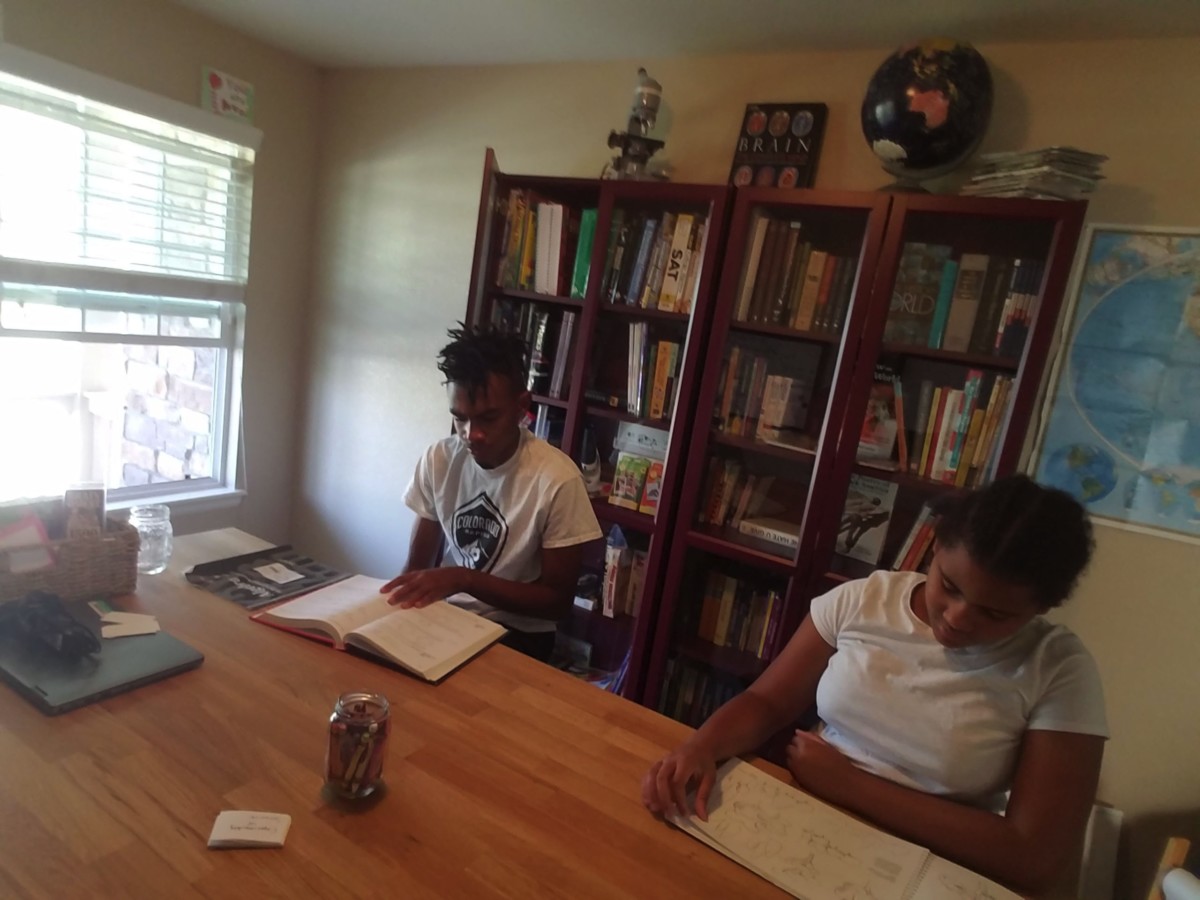
Editor’s note: Joyelle Naomi – a Moonshot EdVentures Fellow – is the founder of the Black Homeschooling Sustainability Initiative (BHSI) and of Denver Independent School (DIS) which will launch in the 2022 – 2023 school year. She spoke to Boardhawk about plans for DIS and why homeschooling can be a path to equitable outcomes for students of color.
Boardhawk: Tell us about plans for your school.
Joyelle Naomi: Denver Independent School (DIS) is a newly formed umbrella school for Pre K-12 home-based learners. While we’ll officially launch in the 2022-23 school year, we are currently running a pilot program this academic year called the Liberated Learning Choice Program. We try to address barriers that prevent families of color from homeschooling their children. We focused on Black families for this particular iteration.
Statistics show that almost all academic obstacles present in other school models disappear when Black children are homeschooled. They outperform public school students of all backgrounds.
When children are schooled at home from an early age they are more likely to be well adapted to their environment and to accept discipline from adults who share a common identity, diminishing early and persistent problem behaviors.
Home-educated students are not exposed to many of the institutional factors that lead to academic failure in the early years and have more freedom for individual learning measured according to the child’s abilities versus against the needs of an institution, which combats academic failure.
And contrary to popular belief that homeschooled children are not properly socialized, home education offers many opportunities for students to socialize with a diverse population through community-based volunteer work, by joining homeschool cooperatives and building relationships with local businesses and organizations, which prevents low neighborhood attachment.
Overall, more than traditionally-schooled children, Black homeschooled students experience physical and emotional safety, score higher on math and literacy assessments, and are able to adjust to a variety of social situations.
Boardhawk: What are the primary barriers to homeschooling?
Naomi: We have seen four major barriers in our years of working with families. This year Covid added an additional barrier, as it has increased cases of families feeling isolated and needing more support to navigate everyday life.
- Economic – Families are receiving a $500 stipend per student to spend unrestricted as long as it helps to start or sustain their homeschool.
- Cultural – Black families often feel they don’t belong in typical homeschool spaces. We’ve partnered with an organization to provide weekly STEAM (Science, Technology, Engineering, Arts, and Math) classes that are rooted in cultural identity. Students have been building drones and simultaneously learning about Black engineers and scientists.
- Whole family – A lot of times the home educators’ needs are not really looked at. We provide health and wellness workshops for the home educator as well as a monthly community coaching call where the moms get together to talk about what is going on with them, how homeschooling is going and they begin to just help each other. Authentically.
- Wrap-around services- Many families are dealing with really difficult life issues such as divorce, poverty, domestic violence and lack of access to mental health services. We partner with organizations in the community that provide support as our families navigate through these difficult circumstances. Currently, some of our families are receiving dinner, snacks and milk for each child seven days a week delivered to their homes through one of our partners.
We’ve been working with the Center for the Study and Prevention of Violence at CU Boulder to test our assumptions on what the barriers are to homeschooling, distance learning and online learning. We are surveying a statewide and nationwide sample. We’ll use the research findings to modify the program we are running now for a second iteration this coming 2021-22 school year.
Boardhawk: So you are gradually building the design and enrollment for Denver Independent School?
Naomi: Yes, we are enrolling this May for the second iteration of our pilot. Right now we have 13 students, from 8 families and we are scaling to 50 students starting in September. Our Liberated Learning Choice Program tests if what we’re doing is beneficial and helpful, so when we fully launch as an independent school the following year we’ll run a program that is making a difference for our families.
And the model of course is that the parents are the ones doing the teaching at home. Parents will have complete autonomy over what curriculum they use.
Boardhawk: A recent survey conducted by Keating Research found that one in six parents in Denver said they’ve taken their child out of Denver Public Schools remote learning and have chosen either homeschool programs, private schools, or different public school districts. How has the pandemic affected your goals for DIS?
Naomi: Three of our moms pulled their kids from the public schools this year in order to homeschool. (You can read one of their stories at the bottom of this post). Enrolling in our program has solidified their commitment to homeschooling. We are finding that the needs for homeschoolers and remote learners (forced into at-home learning by the pandemic) are very similar.
The difference we provide to traditional school and hybrid options offered by area school districts is that we work closely with families to meet their students’ needs. We ask ‘What kind of curriculum do you want? How do we help you obtain it?’ And ‘What kind of learning experiences are you looking to have?’ We also take a “whole-family” approach where we also care about and provide for the needs of the home educator.
Our model of co-creation has been beneficial for families of color and those with children with different learning abilities. We are facilitating ‘community’ in ways that families feel they don’t have anywhere else.
All of our families except for one are single parent households where the mom is working full time, responsible for running the household and keeping food on the table while also being their children’s primary teacher. Community plays an important part in sharing each other’s burdens.
Boardhawk: That sounds daunting – full time work, going it alone as a parent and homeschooling – not for the faint of heart.
Naomi: With Black families there is so much trauma that mothers have endured in the public schools. It got to the point where they say ‘I will not do this anymore. Regardless of how much I have to sacrifice, or how hard this is, we are going to figure this homeschool thing out.’ It doesn’t mean that it’s not difficult or that you don’t drop the ball sometimes or that some semesters your kid may be further behind than you want them to be. The conviction to make it work is there. Deep conviction is a type of ability currency. It sacrificially invests in a dogmatic belief that home-based education is the key that unlocks your child’s ability to thrive.
I tell parents that you first have to understand Colorado law for what’s necessary for educating your child. When you homeschool under a “Notice of Intent,” you are required to school your child for 172 days for 4 hours a day. But the law doesn’t dictate what days it has to be or what hours of the day it has to be. It doesn’t say who has to homeschool. You should be the primary educator but it doesn’t say Dad can’t do it, Grandma can’t help you, Auntie can’t help you. You can’t send your kid to an enrichment program.
You learn to be flexible and creative with when and how you are homeschooling. And with what is counted as school. When you are homeschooling, there are things you can do that are considered mathematics. Cooking or grocery shopping, budgeting can accommodate learning.
We are here to help families who’ve made the decision to promote their kids’ success through homeschooling.
Cynthia’s story
Editor’s note: Cynthia, the mother who wrote this piece, asked to remain anonymous.
I’ve always wanted to homeschool but being a single mom didn’t allow for that as I’ve had to work during the day. However, Covid changed that for me and my daughter. In March of 2020 my job went remote right at the same time my daughter’s school went to distance learning.
I didn’t know much about homeschooling as I grew up in public schools but I had a couple of friends who’ve homeschooled and they were great resources. My daughter completed kindergarten and first grade in the public school district. During those two years we had some ups and downs. My daughter would often get distracted in class if she wasn’t following along or if she felt like what she was doing was boring.
With homeschool we still have ups and downs but mostly up. She is really succeeding and I’ve realized through getting to learn about her learning style that she gets distracted or bored when she isn’t challenged. Homeschooling gives me the freedom to pick the curriculum that works best for her. It gives us the freedom to adapt to her learning style. It gives us the freedom to be in charge of her schedule in order for her to be the most productive.
It gives me the freedom to be able to spend more time with her and watch as she grows everyday. There are so many resources and homeschooling groups to help any parent and or family get started and support along the way. Oh, and her social life hasn’t been impacted – I would say it’s even better. There are homeschooling groups that meet weekly (including the weekly co-op through Denver Independent School). Some groups are virtual due to Covid. There are many places that have homeschooling where you can meet new families. Recreation centers have classes/programs dedicated for homeschooled families.




